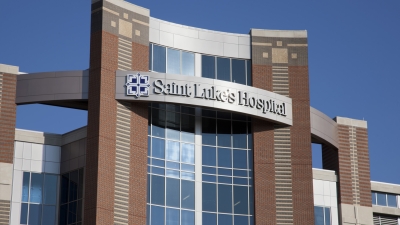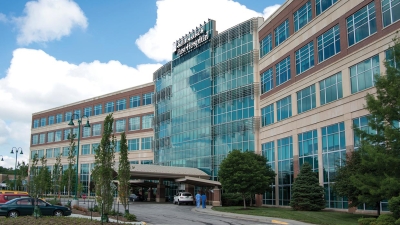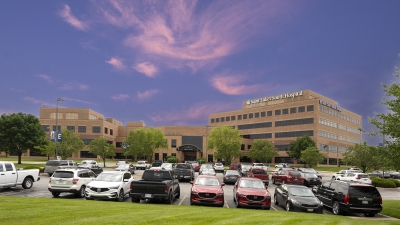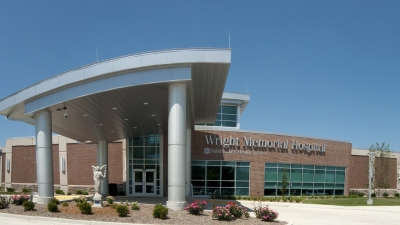Heart Attack
A heart attack, also known as acute myocardial infarction (AMI) is what happens when blood cannot get to part of the heart muscle. Part of the heart muscle then begins to die. A heart attack can be deadly. It is vital to get help as soon as possible.
Chest pain is the most common symptom of a heart attack. You may feel the pain in only one part of your body, or it may move from your chest to your arms, shoulder, neck, teeth, jaw, belly area, or back. If you have symptoms of a heart attack, call 911 right away and get to a Saint Luke’s Health System hospital fast.
Every minute counts during a heart attack. The Emergency Departments at each of our hospitals provide protocol-driven chest pain management. Our clinicians use time-saving measures to ensure patients having a heart attack receive critical cardiac care—including lifesaving emergency angioplasty—as quickly as possible.
Saint Luke's Hospital, Saint Luke's East Hospital, Saint Luke's North Hospital, and Saint Luke's South Hospital have all earned U.S. News and World Report "Best Hospitals" as High Performing hospitals in Heart Attack.
Saint Luke's Hospital has received the Get With The Guidelines Mission Lifeline: Gold Plus Target: STEMI Receiving Award from the American Heart Association.
What is a heart attack?
A heart attack is also called a myocardial infarction (MI). It happens when one or more parts of the heart muscle don’t get enough oxygen. That occurs when blood flow to the heart muscle is narrowed or blocked.
If the blood and oxygen supply is cut off, muscle cells of the heart begin to suffer damage and start to die (infarct). Permanent damage begins within 30 minutes of blockage. The heart muscle may then no longer work as it should.
What causes a heart attack?
A blockage in the coronary arteries that supply blood to the heart muscle can lead to a heart attack. A blockage is caused by a buildup of plaque. This is called atherosclerosis. Plaque is made up of deposits of cholesterol and other substances. When a plaque breaks (ruptures), a blood clot quickly forms. The blood clot is usually the cause of the heart attack.
Who is at risk for a heart attack?
A heart attack can happen to anyone. But certain factors can raise your risk for one. Some of these factors you can’t change. Others you may be able to manage through lifestyle changes and medical care.
You may be at higher risk for a heart attack if you:
Have high blood pressure
Have low levels of high-density lipoprotein (HDL) cholesterol, high levels of low-density lipoprotein (LDL) cholesterol, or high levels of triglycerides.
Have a family history of heart disease. This is especially true if the heart disease started before age 55.
Are older in age. Generally, males are at risk at a younger age than females. After menopause, females are equally at risk.
Have diabetes.
Smoke, including chewing tobacco and electronic cigarettes (vaping)
Are under a lot of stress
Drink too much alcohol or use illegal drugs
Are not active
Are overweight
Eat a diet high in saturated fat and low in fiber
What are the symptoms of a heart attack?
Each person may have slightly different symptoms of a heart attack. But these are the most common symptoms:
Severe pressure, fullness, squeezing, pain, or discomfort in the center of the chest that lasts for more than a few minutes
Pain or discomfort that spreads to the shoulders, neck, arms, or jaw
Chest pain that gets worse with exertion
Chest pain that doesn't get better with rest or by taking nitroglycerin
Chest pain that happens along with any of these symptoms:
Sweating
Cool, clammy skin or paleness
Shortness of breath
Nausea or vomiting
Dizziness or fainting
Unexplained weakness or fatigue
Fast or irregular pulse
Chest pain is the key warning sign of a heart attack, but it may be confused with other conditions. These include heartburn, pleurisy, and pneumonia. Since you don't always know the reason for the chest pain, always call
How is a heart attack diagnosed?
If you or someone you know has any of the warning signs for a heart attack, act right away. Call
Diagnosing a heart attack often happens in an ER. There, a doctor will ask you about your symptoms and health history and do a physical exam. You may also need some tests, such as:
Electrocardiogram (ECG). This test checks the electrical activity of your heart. It can find signs of a heart attack.
Blood work. These tests can find certain proteins that the body may make during a heart attack.
Coronary angiography. During this test, a tiny plastic tube (catheter) is put into an artery in your groin or arm. It's moved to the heart while monitored with fluoroscopy (video X-ray). X-ray dye (contrast medium) is then put into your coronary arteries. Special X-rays (angiograms) are then taken. They show how well blood is flowing through your heart and blood vessels. The test can find blockages in an artery.
How is a heart attack treated?
The goal of treatment for a heart attack is to ease pain, restore blood flow to the coronary artery, preserve the heart muscle function, and prevent death. Treatment may include:
I.V. (intravenous) therapy. Medicines, such as nitroglycerin and morphine, are given through a tube into a vein for pain relief and to relax the heart arteries.
Oxygen therapy. This treatment can give the damaged heart muscle more oxygen.
Cardiac medicine, such as beta-blockers. These can help the heart muscle rest, prevent an irregular heartbeat, and decrease heart rate and blood pressure.
Fibrinolytic therapy. Medicine is given by an I.V. (intravenous line) to dissolve the blood clot, restoring blood flow.
Antithrombin or antiplatelet therapy with aspirin or clopidogrel/ticagrelor. This is used to prevent more blood clotting.
Medicines that lower cholesterol, particularly LDL cholesterol. These include medicines, such as statins. Newer medicines called PCSK9-inhibitors are for people with inherited high cholesterol. Ask your doctor if these medicines may help prevent a heart attack.
You may also need other procedures to restore blood flow to the heart. These are described below.
Percutaneous coronary intervention (PCI) or coronary angioplasty
This is the preferred treatment for an acute heart attack. It involves opening up a blocked or narrowed coronary artery. There are several ways to do so. After coronary angiography has found a blockage, a new catheter with a small balloon at its tip may be inflated inside the blocked artery to open the blocked area. Or the blocked area may be cut away with a special device or vaporized with a laser. A tiny metal coil called a stent is often expanded inside the artery. The stent remains in place to help keep the artery open.
Coronary artery bypass graft (CABG)
This surgery is also called coronary artery bypass surgery or CABG (pronounced "cabbage"). It is often done in people who have chest pain (angina) and severe coronary artery disease that can't be treated with PCI. During the surgery, the surgeon makes a bypass to let blood flow around the blockage. This is done by grafting a piece of a vein from the aorta to the coronary artery beyond the blocked part of the artery. The surgeon often takes veins from a leg. Arteries from the chest or an arm may also be used to bypass blockages. These bypasses last longer than vein grafts and are, therefore, preferred.
What are possible complications of a heart attack?
Possible complications of a heart attack include:
Damage to the heart or heart valves
Abnormal heart rhythms
Another heart attack
Heart failure because the heart doesn't pump as well as it once did
Shock and other organ failure
Death
What can you do to prevent a heart attack?
Talk with your doctor about your risk for a heart attack. You may be able to prevent a heart attack by:
Lowering the levels of your blood pressure, LDL cholesterol, and triglycerides, if needed
Not smoking
Lowering your stress levels
Not drinking too much alcohol
Being more physically active
Losing weight, if needed
Eating a healthy, low-fat diet
Key points about a heart attack
A heart attack happens when one or more areas of the heart muscle don’t get enough oxygen. This happens when blood flow to the heart muscle is narrowed or blocked. This causes areas of the heart muscle to become damaged or die (infarct).
A blood clot is the usual cause of a heart attack. It can form when there is a blockage in the arteries from plaque buildup.
Having high blood pressure and a family history of heart disease can raise your risk for a heart attack.
Severe chest pain or discomfort is often a symptom of a heart attack. But you may also feel short of breath, nauseous, fatigued, or dizzy.
A coronary angiogram can find blockages in an artery.
Treatment includes medicines and procedures to restore blood flow to the heart.
Next steps
Tips to help you get the most from a visit to your doctor:
Know the reason for your visit and what you want to happen.
Before your visit, write down questions you want answered.
Bring someone with you to help you ask questions and remember what your doctor tells you.
At the visit, write down the name of a new diagnosis and any new medicines, treatments, or tests. Also write down any new directions your doctor gives you.
Know why a new medicine or treatment is prescribed and how it will help you. Also know what the side effects are and when they should be reported.
Ask if your condition can be treated in other ways.
Know why a test or procedure is recommended and what the results could mean.
Know what to expect if you do not take the medicine or have the test or procedure.
If you have a follow-up appointment, write down the date, time, and purpose for that visit.
Know how you can contact your doctor if you have questions.

Locations

Saint Luke's Hospital of Kansas City

Saint Luke's East Hospital

Saint Luke's South Hospital

Saint Luke's North Hospital–Barry Road

Saint Luke's North Hospital–Smithville

Hedrick Medical Center

Wright Memorial Hospital

Anderson County Hospital

Allen County Regional Hospital
Recent News
Patient Stories
Innovative Heart Failure Device Helps Lawrence Woman
Article
A Simple Test Can Help Determine Risk for Heart Attack
News
Heart Attacks Rise During the Super Bowl. You Can Take Precautions.
News
Women's Heart Health - Who's at Risk for Heart Attack And Stroke?
Article
Lucky Breaks
Article